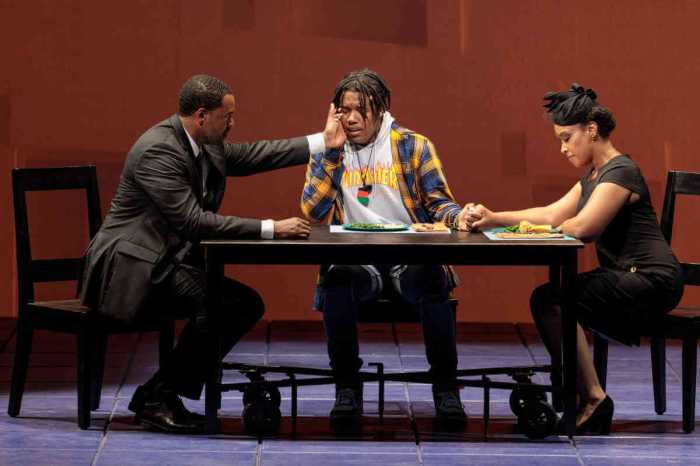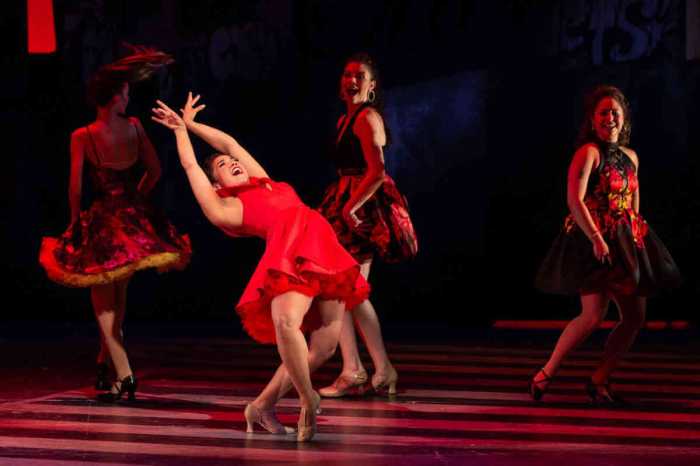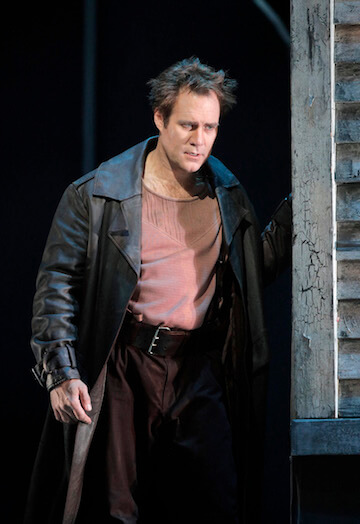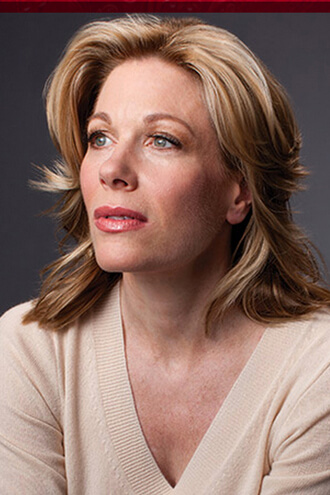Andrea Carroll, Ryan McKinny, and the ensemble in the Glimmerglass Festival production of Rodgers and Hammerstein’s “Carousel.” | KARLI CADEL/ THE GLIMMERGLASS FESTIVAL
BY DAVID SHENGOLD | The Boston Symphony Orchestra’s summer venue, leafy Tanglewood in rural — if in places pricey — western Massachusetts, is a delight to visit and seats on the lawn are ultra-cheap. July 27’s matinée concert was to have been led by the venerable Rafael Frühbeck de Burgos, who died earlier this year. Jacques Lacombe made his BSO debut on short notice replacing him in a Rachmaninov/ Verdi concert.
Virtuoso — but not keyboard banging — pianist Gabriela Montero, also a BSO newcomer, opened with the Rachmaninov Second Concerto. It was an impressive performance, though in places Lacombe and she might have been in better synch. After intermission, John Oliver’s huge festival chorus appeared for the Verdi portion — the Overture and anthemic chorus “Va, pensiero” from “Nabucco” and Triumphal Scene from “Aida.” In “Va, pensiero” — kind of a secondary Italian national anthem — the women sounded young and fresh, the men, particularly the tenor section, less so. Orchestra choruses, even first-rate ones like this, tend to sing Latin, German, French, and even English more than they sing Italian. It showed, with very middle-of-the-road American vowels and a general lack of bite in articulating the text.
Marjorie Owens made a fine impression as Aida, with a soaring, free top allowing her to be heard over the huge ensemble. Her solo cadenza showed fine musicianship and control. The Virginia-born lirico-spinto soprano, a fixture at Dresden’s first-class opera house, makes a one-off Met debut as Aida on January 2 — I would plan to be present. Elizabeth Bishop had little solo time as Amneris, but she’s always a fully professional, reliable dramatic mezzo.
Tanglewood Verdi, Glimmerglass Rodgers
With impressively forward diction, Philadelphia’s Issachah Savage sounded bright and pingy as Radames. Hot off his Caramoor triumph as Rigoletto, Stephen Powell (Amonasro) showed his sterling sense of line and dynamics; other baritones, who couldn’t hold a candle to his elegance and vocal mastery in most of the Verdi canon, might convey more savage power.
Repeating his 1979 Met debut role (the King), Julien Robbins sounded as steady as ever, with well-sculpted phrases and no diminution of sound at register extremes— proof of his remarkable vocal longevity. Why does the Met feature so many inferior basses, while awarding Robbins just one performance last season? Of course, neither Robbins nor most basses command the sheer howitzer resonance and dark tone of Morris Robinson, whose awe-inspiring Ramfis perceptibly amazed his hearers.
Glimmerglass Opera had a very good though not top vintage season this summer. Artistic and general director Francesca Zambello has taken welcome strides to integrate the company back into the upstate communities around Cooperstown, beyond the narrow concentration on high-end patrons by Glimmerglass’ former regimes. Locally sourced food trucks, active collaboration with local museums in sponsoring exhibits related to the works presented, more evident diversity, and a greater presence of children on campus and at performances all seemed hopeful signs.
Zambello’s policy of presenting one classic musical comedy per season — blessedly with full orchestras but without the distorting amplification that destroys scores (not to mention singing techniques) on Broadway — is amply justified when the shows have merit and call for classically trained singing. Certainly opera is trending in the direction of including ambitious works of music theater — partly for reasons of economics and audience building — and confronting the challenges of performing these works with style will be an asset to the Young Artists whom the company trains.
One or two individual performances aside, I found last season’s “Camelot” a grim exercise, since the reasons it’s remembered have little to do with the music and nothing to do with the book. This year’s “Carousel” featured Richard Rodgers’ much superior score, and Doug Peck had the orchestra and fine chorus well in hand. Hammerstein’s book is on the side of the angels but — even in a season showcasing four women betrayed by men they love — it remains hard to care for or about Billy Bigelow, its hero. Ferenc Molnar, the playwright of the source material, “Liliom,” reportedly liked the musical’s sugary Thornton Wilderesque ending. To me, the dream ballet (danced with wonderful fire here by Carolina M. Villaraos and Andrew Harper) always derails the plot, and what follows matters but little.
Charles Newell’s production rather minimized the dark aspects that give this piece its special coloration. John Culbert’s set was plain but usefully configured, its main adornment a lone, hovering carousel horse. The female leads were strongly cast. Andrea Carroll acted a compelling, haunted Julie and showed off a quietly gorgeous, pearly timbre. Sharin Apostolou occasionally punched individual sung words too far out of the line, but in both personality and voice made a winning, energized Carrie. Zambello has promoted gifted contralto Deborah Nansteel’s career, and with reason — her Nettie Fowler showcased beautiful tone and sympathetic dignity. As yet she lacks the star presence pizazz the part demands, but the promise is clear.
Ryan McKinny qualifies as a barihunk — a tall, sexy guy with a great smile, which promised well for Billy Bigelow. He moved well onstage and was ingratiating, but his performance lacked the dimension of unstoppable menace to himself and others the story demands. McKinny, an up-and-coming Wagnerian, spoke lines reasonably well, but his singing was disappointing. Impressive as he sounded last year as the Flying Dutchman, here the voice often sounded thick-complected and monochromatically over-muscled for the idiom.
Ben Edquist, who made an impactful, uncommonly well-sung Jigger Craigin, might have served Billy’s part better. Joseph Shadday’s Irish-style tenor sounded apt as Enoch Snow. Actors Wynn Harmon (Starkeeper/ Dr. Seldon) and Rebecca Finnegan (Mrs. Mullin/ Heavenly Friend) stood out for their professionalism and clear textual delivery.
“Carousel” launched the weekend pleasantly. Reviews of the three operas performed at Glimmerglass follow in the September 18 issue.
David Shengold (shengold@yahoo.com) writes about opera for many venues.




































